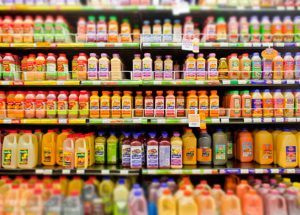 For most households, fruit juice is a staple in the fridge.
For most households, fruit juice is a staple in the fridge.
It is an easy, inexpensive purchase that is usually accompanied with health benefit claims.
Unfortunately, your fruit juice may not be as healthy as you are led to believe.
It is important to read and understand every aspect of fruit juice labeling in order to best choose a fruit juice that fits you and your family’s health needs.
Labels
If you look at the juice options in your grocery store, you will see labels that say, “fruit juice”, “fruit beverage”, “fruit cocktail”, “100% fruit juice” and “all natural”.
You may even see a beautiful picture of the fruits that should be in that juice, but beware—the marketing teams for those companies know exactly how to make you believe you are getting the best quality ingredients when the truth may be a little different.
Let’s talk about each label and what it actually means.
100% Fruit Juice
This label can be so deceiving.
It really does sound like the drink is entirely composed of the juice of fruits, but did you know that these drinks can also contain other additives and flavorings?
Last time we checked, “100%” should indicate that there are no other ingredients.
An example is V8 Original Vegetable Juice.
On the front of the container, it claims to be “100% vegetable juice”, but apparently that only means about 98% is vegetable juice since it “contains 2% or less of: salt, vitamin C (ascorbic acid), natural flavoring, citric acid”.
Clearly, the process involved adding more than just veggie juice.
Fruit Juice Beverage
Fruit juice that is qualified with “beverage”, “cocktail” or “blend” does not contain only juice from fruits.
These deceptively labeled drinks could have just about any percentage of juice, meaning you may not be getting much actual juice from fruits.
According to the FDA, the percentage of juice is required to be on the label somewhere except in the circumstances that “(a) the product is described using the term ‘flavor’ or ‘flavored,’ (b) the term ‘juice’ is not used other than in the ingredient list, and (c) the beverages do not otherwise give the impression they contain juice such as with the use of explicit vignettes on the label or physical resemblance of the beverage to juice such as pulp.”
From Concentrate (or reconstituted)
Beverages that are made from reconstituted juice should be avoided for a few reasons.
A juice concentrate is made by heating fruit juices in order to remove the water.
Once that has occurred, it is shipped to another facility where water (typically in the same amount removed) is re-added with additional ingredients to make the juice that you will buy from the store.
During that heating process, key nutrients are heated out of the juice.
Not from Concentrate
While this seems to be healthier at first glance since it does not contain reconstituted fruit, don’t be fooled into thinking it is always better! For example, many orange juice bottles have this claim on them, but did you know that when the orange juice is being stored before bottling, it can remain in giant tanks without oxygen for up to a year?! As you can imagine, the juice begins to seriously lose its flavor.
To fix this problem, the company will add “flavor packs” to boost the taste, and you will never know because it is not required to be on the ingredient label since the flavor packs technically come from orange essence or oil. And you thought you were getting fresh orange juice straight from the orange.
Pasteurized juice
Some exchange the word “pasteurize” for “de-nutritionized” in an effort to simply, yet effectively convey the reality of pasteurization.
Juice is pasteurized in an effort to remove any potentially harmful bacteria that may have grown during the processing period.
Unfortunately, it also removes any helpful or beneficial nutrients.
So, if your juice is made from concentrate and pasteurized, almost no nutrients remain from the original fruit, meaning it has to be added back in at the end of the processing.
GMOs
If you notice the ingredient label of not only fruit juices, but many other foods and beverages, many of them will contain an ingredient called “citric acid”.
You would think these ingredient is derived from citrus-y foods like lemons and limes, but sadly, you would be wrong.
Citric acid is typically created from genetically engineered sugar beets and corn whose glucose is fermented in a lab. Some companies even add sugar and high fructose corn syrup which are most likely derived from GMO sugar beets and corn.
Not only are GMO products treated with pesticides, but the damage they may cause on the human body has never been tested long-term.
Even without long-term testing, however, they have been found to be linked to allergies, autoimmune disorders and infertility.
Deceptive labels
Some bottles of fruit juice make claims like “23 blueberries, 3 ½ apples and 1 banana in each serving”.
This really makes it sound like they blended these fruits together and then packaged it into a cute bottle, but the reality is that these fruits have been blended from concentrated fruits.
The amounts listed are just estimates made by the company.
What is the best kind of juice to buy?
Many of the juices you come across in the store are not ideal for buying, but if you look, you can find some that will benefit your body and add key nutrients to your diet.
When determining whether or not to purchase a specific beverage, think through this criteria:
- Choose juices labelled “100% fruit juice” and have no other added ingredients on the ingredient list.
- Juices that are cloudy and have sediment at the bottom contain more of the fruit’s pulp, skin and/or seeds.
- These drinks will contain more nutrients.
- Choose organic juices to avoid pesticides in your drink.
- Choose high-quality “common” juices like orange juice or apple juice.
- Make sure there is no added sugar as fruit is already naturally sweet.
- Buy “cold pressed” juice. A 2011 study in Food Chemistry found that cold-pressed apple juice contained almost eight times more vitamin C than pasteurized apple juice.
Juice Brands from Worse to Best
Here are brands categorized from worst to best:
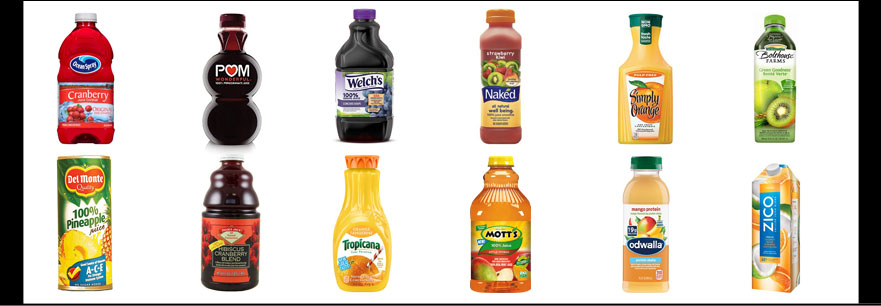 Non-organic pasteurized
Non-organic pasteurized
V8, Naked Juice, Zico, Odwalla, POM, Simply Orange, Bolthouse Farms, Tropicana, Ocean Spray, Minute Maid, Mott’s, Del Monte, Welch’s, Trader Joe’s Organic (from concentrate or with additives)
Organic (from concentrate or with additives)
Santa Cruz, 365 Brand (some), Lakewood (some), Honest Kids, Purity, Trader Joe’s (some)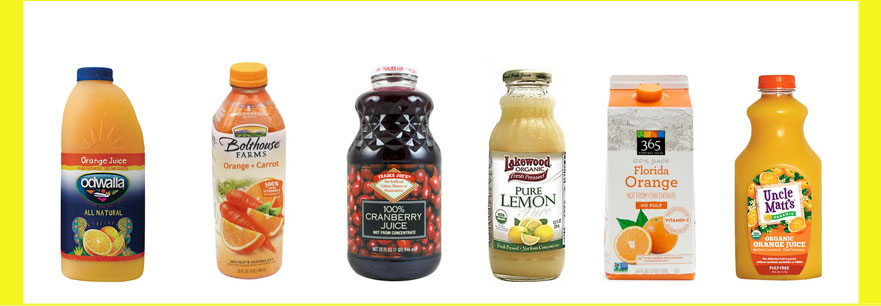 100% Organic not from concentrate
100% Organic not from concentrate
Uncle Matt’s, 365 Brand, Lakewood, Bolthouse Farms (some), Odwalla (some), Trader Joe’s (some)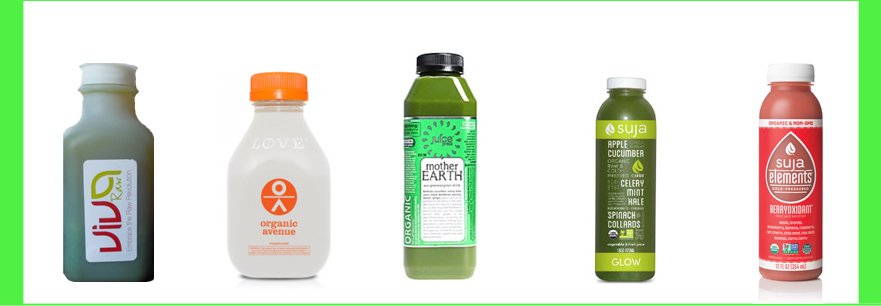 Fresh Raw Organic (Cold-pressed or High Pressure processing)
Fresh Raw Organic (Cold-pressed or High Pressure processing)
Those made fresh on-site, Suja Juice, Suja Elements, Juice Press, Organic Avenue, Luna’s Living Kitchen, Viva Raw
Next time you plan on purchasing fruit juice with the goal of bumping up your daily nutrient intake, be sure to check out what you are really purchasing.
If you buy juices that are not nutrient-dense or are low-quality, you might as well be buying sugary sodas.
Choose the best juices for your best health!
To protect yourself from these toxic chemicals (which lead to higher risk of cancer) in many of our everyday’s food, go to the next page and discover how to boost your immune system –
About the Author:
Emma Deangela is the best selling author of The Alkaline Diet Program and 80/20 Fat Loss. She has helped over tens of thousands of men and women to lose weight and transform their health with sound nutrition advice. Learn how you can lose weight fast – How to lose weight by adding these alkaline foods.
Do you drink any of these fruit juices?
Please share with your friends this article on Fruit Juice – Use any of the social media and email buttons on the left of our website.
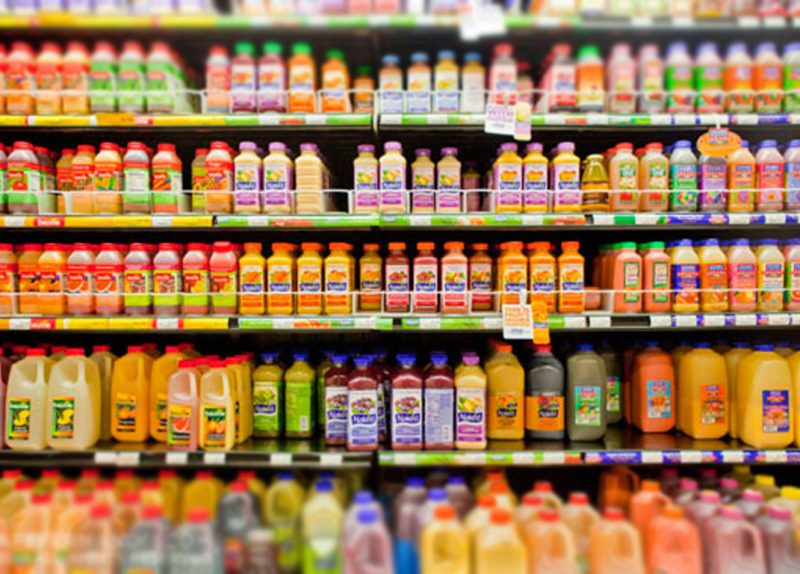

Leave a Reply to Julie Eden Cancel reply